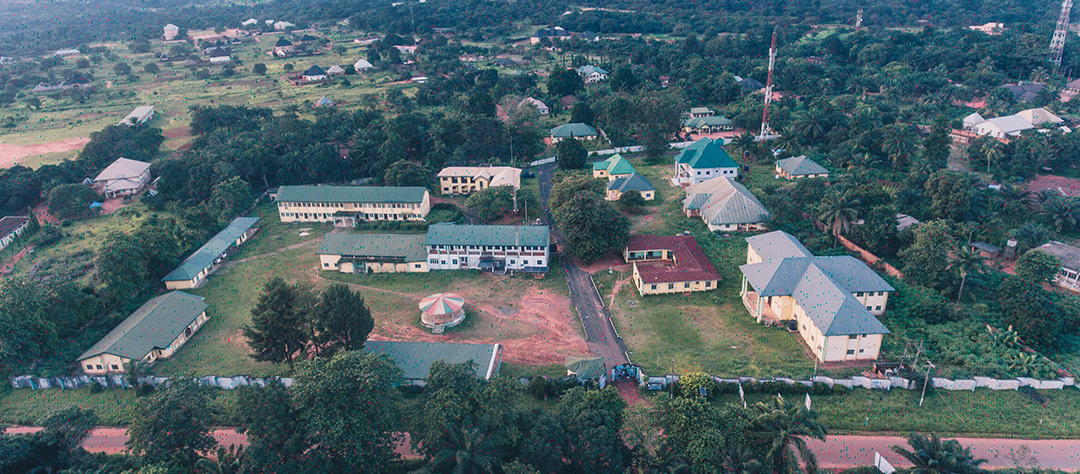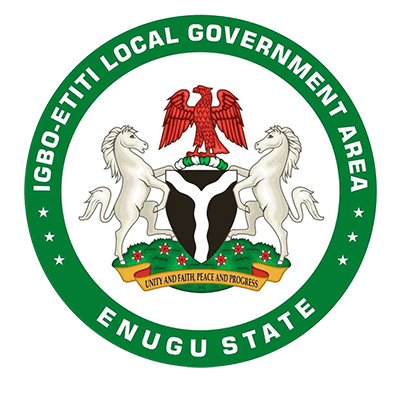ABOUT IGBO-ETITI LGA
THE MANPOWER
OF THE EAST
The Formation Of Igbo-Etiti
Igbo – Etiti: The manpower base of Enugu State
Igbo Etiti Local Government Area metamorphosed through various administrative changes before it got to its present status. It partly came into existence under the Ordinance Act of 1950 but was replaced by a 1958 Act which abolished the three-tier system by transferring all the functions of the District Council to the new County Council envisaged under the Act. In 1959, the name was formally restored to County Council. However, the operating system remained the same. The Nigerian civil war of 1967 to 1970 put everything about carving new administrative units on hold. Nsukka Province then had four (4) Divisional County Councils, namely: Igbo-Etiti (Nsukka), Igbo-Eze, Isi Uzo-and Uzo-Uwani councils. After the civil war in 1970, the Military Government abolished County Councils and a Divisional Administrative Edict was promulgated. The functions of the County Councils were taken over by the District Administrative Department through the instrumentality of Residents and Local Government Commissioners with Residents administering the Divisions. Local Government reform committees were set up to further reform the entire system. The Reform committee’s recommendation led to the splitting of some Divisions. The then Igbo-Etiti Division was split into two, Nsukka and Igbo-Etiti in 1976. Nsukka town remained as headquarters of Nsukka, while Igbo-Etiti had Ogbede as its headquarters. (Okeke.2022)

Our Borders
Accessibility Routes
The present Igbo-Etiti Local Government Area shares borders with Nsukka Local Government to the North, southwards by Udi and Enugu East Local Government Areas. To the East, it shares a boundary with Isi-Uzo Local Government Area and to the west, it is bordered by Uzo-Uwani. Igbo- Etiti is said to have a land mass covering a total of three hundred and twenty-five (325) square kilometres and has an average temperature of 27 degrees centigrade.
The Local Government Area old be accessed using three major roads; the old Opi- Ninth Mile route, the Otukpo- Obolo-Afor, Opi- Ohodo, Ozalla- Umuna- Ohebe- Ukehe-Ochima-Onyohor to Ninth Mile and the new Opi – Egu-Ekwegbe route to Enugu. Depending on where one is coming from another route though not busy as the first three is the Nkpologwu-Aku- Ikolo- Ogbede- Ukehe route.
Our Peoples Major Occupation
We are known to be Hardworking
Located in the tropics, it witnesses two seasons each year; the dry and rainy seasons. Farming, a major occupation of the people is supported by amble rainfall as the area records up to an average of 1900 millimetres of rain annually. This volume of rainfall helps to sustain the green vegetation in the area and adds to its’ natural beauty. Floods arising from the rains help swell the volume of water in the lake at Amadim, Ukehe which extends up to Umulumgbe in Udi Local Government, The hills in the area are laden with mineral resources which remain untapped, especially hematite that are good sources of iron. From these hills, the early iron smelters sourced their primary raw material. In Aku, this very precious resource was mined from Iyiahor, Amogwu and Oshigo hills in the olden days.
One other area where the local government is a leader is in the area of cattle rearing and commerce in general. Ekwegbe, Ohodo, Ozalla and Ohebe communities are known for the rearing of the traditional humpless Igbo cow (efi Igbo). Uzo Nwigwe of Ozalla was reputed to have many cattle that he lost count of the number. This industry when and if promoted will stem the tide of attacks by Fulani herdsmen as their specie of cattle is more adapted to the environment. The weaving of traditional clothes, especially those used in title-taking, is a speciality of their women who also mixed the trade with the manufacture of local dyes. Palm produce abounds in the communities and Ukehe, Ohodo, Diogbe, and to some extent Ohebe are renowned for very quality palm wine for men of class. Daily markets arose in all these communities for the sale of palm wine with Ekwegbe and Umunna producing in commercial quantities.
Cultural Division
Based on masking tradition
Culturally, the communities in the local government area are divided into two based on the masking tradition prevalent in them, Hence, we have the Igbo Odo and the Igbo Omabe group. Communities under the Igbo Odo group include Ikolo, Aku, Diogbe, Umunko, Ukehe, Onyohor, Ochima, etc while in the Omabe group, we have Ohodo, Ozalla, Ekwegbe. The local government is further grouped into micro zones of federating communities for political exigency and such arrangement had been used in the sharing of political offices among the towns in the Local Government. These first is Igbo Iri n’ebọ comprising of Diogbe, Umunko, Ummunna, Ekwegbe, Ozalla, Ohebe Dim, Ohodo, Ikolo, Ochima, Udueme, Idoha and Onyohor. The second is Ukehe and the third is Aku. Whether Odo or Omabe, there were men who acted as the chief priests, These are called Dikwu or Akpara, and in consultation with the elders' the council monitored and ensured that the traditional calendar was followed.
Religion
We believe there is God above all
The people are highly religious as many deities regulated their conduct. These include Ehuru (Efuru) of Ideoha, Ugwuepii of Ekwegbe, Ugwuamokofia of Ukehe, Ojiyi of Aku, Egbiyi of Ozalla. When cases defy human solutions, they were taken to the deities (the province of divine wisdom) to resolve and in most cases, there were specific signs attached to each deity as evidence that it struck the guilty party. Some like Ugwuamokofia are said to offer protection to their adherents, especially those who swallow pebbles from its precincts. Even with traditional religion still enjoying some level of patronage especially because of its link with traditional medical practices, Christianity is well established in the communities, There are some Muslims but they constitute a serious minority.
The Man-Power Of The East
What makes us what we say we are
Aku women were the most known itinerant women traders in Igboland and Enugu State in particular before and during the colonial era. One of them named Ochiebo Nwugwu was so influential that she was among the people who used her resources to influence the establishment of the Church Missionary Society (CMS) in Aku in 1932. Mrs Nkechi Ugwu-Oju was the first female Local Government Chairperson in Enugu State. Professor Rose Osuji is the first female professor of Physics and Astronomy in the state. In the field of education, the local government has more professors than any other local government in the state. For instance, the Aku community boasts of having more professors than any other community in Enugu State (https://luckisworld.wordpress.com/2014/12/20/aku-diewa-day/, https://ke.opera.news/ke/en/education/34ec6562979f54cbaa7439f2426eb0cc ) It is instructive that the President of Association of Nsukka Professors (ANP), in the person of Professor Osy Okanya, is from Aku, a town in Igbo-Etiti Local Government Area. Interestingly, they are spread across disciplines. For instance, Professor Aloysius Attah is a professor of Aeronautical Engineering, Mathew Edoga is a professor of Chemical Engineering, Vincent Ozor is professing Theology, Clement Anikwe is in Aero Space engineering and Cyprian Onyeji is of Pharmaceutical Chemistry just to mention a few.
In politics, Igbo-Etiti holds an enviable record. Ochima, a town in the local government is widely respected as one of the oldest communities where human settlement started in Igboland. This community (Ochima), though not populous was able to resist colonial authorities to the extent that their opposition led to the killing of its citizens by Major G. L. D. Rewcastle, D.S.O., M.C., Assistant Commissioner of Police, on 27th January 1924. That the community paid dearly for that action is not in doubt as a military expedition was sent to the community and that culminated in the death of many of its citizens. However, their action gives them the enviable position of being one of the early nationalists that remain unsung. ( For a detailed account of the Ochima saga see National Archives Enugu (NAE) OP 1029 ONPROF 8/1/4724, J. Barmby, “Intelligence Report on the Villages of Ukehe, Onyoho, Ochima, Ikolo, Aku, Ohebe, Umuna, Ngalakpu, Umunku and Idoha, Nsukka Division,”).
One of the incontrovertible evidence of its (Igbo –Etiti) being the manpower base of Enugu state is its contribution to ironworking technology as it remains one of the early sites of Iron smelting in Nigeria. (Connah 2004:56) submits that the knowledge of iron smelting not only gave those who used it a technical advantage but also economic, ritual and political power and that that was the power of metal and the people of Africa would never be the same again. There is manifest evidence of iron smelting in some of the communities in the local government. Aku, Ekwegbe, Onyohor and Ozalla are typical examples where surface evidence in the form of slag is seen to date. The traditional masked beings in some of these communities called Odo are linked with iron technology. The Okikpe, a class of the being, is seen with metal gongs adorning its head region as a testament to its link with iron. That these communities had a serious advantage in certain fields is noticed in their mastery of the positive manipulation of ontological forces. One of the incarnate beings in Aku called Odo Achi is known for its precision in prophecy and is reputed to have predicted the Nigerian civil war. Another known as Imerekime (Merekime) is known for the quick resort to biological warfare through the use of honey bees to attack adversaries (Alaku, 2019). Harnessing these two cultural elements would serve as a good tourism potential in the area and could serve as a way of probing into some indigenous knowledge systems that made the Igbo thick
Citizens Achievements
Our Citizen's Great Strides
From the colonial to the post-colonial era, some of its citizens made very big marks on the nation by occupying political positions. Late Chief J.U.Nwodo during the First Republic occupied some prominent positions. Between 1957 and 1958 he was the Minister of Works in Eastern Nigeria, President Igbo-Etiti County Council from 1958 to 1966, Minister for Commerce and Industry, in Eastern Nigeria from 1959 to 1961, and Minister in charge of Local Government from 1961 to 1966. How many local governments in the state had its citizen occupying such positions? More so, the master plan for the development of Eastern Nigeria which has long been abandoned by successive administrations was birthed under him and some of his colleagues. In the Second Republic, some of its citizens occupied some enviable positions in the old Anambra state, Chief Edmund Duke Itanyi was the Majority Leader of the State House of Assembly. Chief Ajima Nwodo was a zonal commissioner for the State School Management Board; Emmanuel Igwe was the Commissioner for Trade and Co-operatives. At the federal level, John Ogbonna Nwodo (Nnia) was the first Igbo man to become the Students Union President at the University of Ibadan, the youngest serving minister in the Second Republic where he was the minister of Civil Aviation, later that of Information under the military regime of Abdulsalam Abubakar, and he was the President General of Ohanaeze Ndigbo These records are yet to be beaten.
His brother, Okwesilieze Nwodo was first in many things; first elected Governor of Enugu state, first secretary of the Peoples Democratic Party (PDP) and first from the state to become the national chairman of PDP. His mantra of triangular equilibrium endeared him to many people as it was based on the principle of equity and justice among the three senatorial zones in the old Enugu State which he governed. For a citizen of the local government to emerge as the first executive Governor of the old Enugu state comprising of parts of present Ebonyi state speaks volumes of their claim, This is more eloquent when how he emerged after all the machinations of those who never wanted his brother to emerge as Governor were silenced. The local government produced a one-time deputy Governor of the state as presently constituted in the person of Ezenwata Okechukwu Itanyi as well as a speaker of the state Assembly in the person of Eugene Odo. Another prominent son of the local government in the person of Emeka Ugwu-Oju played a very vital role in the return of Nigeria to democracy through his activities in the National Democratic Coalition (NADECO). Eventually, when the country returned to democratic rule under Obasanjo in 1999,.he and other concerned Nigerians kept watchful eye on the polity, Felling disappointed that their expectations for a better Nigeria were not met, he and his associates began to mute the idea of how to put things right. That idea gave rise to the formation of the Good Governance Group (GGG) and he was the convener of the group. Igbo-Etiti boasts of one of the outstanding soldiers in the state in the person of Brigadier JOJ Okoloagu who is a member of the Board of Trustees of the ruling All Progressive Congress (APC)
In the health sector, Igbo Etiti became very prominent during colonial times for the treatment of yaws. The health facility at Agba eputu Ekwegbe became a rendezvous for all inflicted with the ailment. One of its sons, Dioka Ejionueme through his role as Director of Enforcement in the National Agency for Food and Drug Administration and Control (NAFDAC) played a very prominent role in weeding the nation of fake, substandard, expired and adulterated drugs by publicly destroying such life-threatening drugs. No other person in the state holds such a record. In a nation where official records drawn from a 2021 survey report show that 47 million Nigerians practice open defecation, achieving the target of making the nation open defecation free on or before 2025 is no mean fit, In Ikolo community, Ama Uwani village as of November 19, 2022, had achieved ninety per cent of that; a record not seen in any other community in the state,( https://www.unicef.org/nigeria/stories/use-toilet-end-open-defecation )
In the legal field, the name Late Dr Joseph Nnabuchi Nwodo rings a bell. A legal luminary of international repute, he paved way for foreign direct investment in Nigeria, by exploring the possibility of applying for foreign companies, which execute projects on behalf of the Nigerian government, to be exempted from the requirement of registering new companies in Nigeria. This initiative succeeded with the exemption granted to several foreign companies, which engaged his service. At a point, he served as Nigeria’s legal counsel to foreign banks who certified that proposed loan agreements between foreign banks and the Federal Government of Nigeria were legal, valid and enforceable in Nigeria as a condition precedent to the coming into force of such loans. His engagement as the external solicitor to the defunct Nigerian Industrial Development Bank enabled him to prepare numerous and diverse loan and mortgage agreements for the financing of many industrial projects. He was legal adviser to Fichtel and Sachs AG, a leading manufacturer of motor vehicle clutches and transmission systems in Germany, and Wayss and Freytag AG (sister company to Julius Berger AG). He was the legal adviser to a German-Austrian consortium of 17 companies that built the Aladja Steel plant. He also had legal retainerships with Michael Thomas and partner KG, Ferrostaal AG, and a host of others. (https://www.sunnewsonline.com/joe-nwodo-the-lawyer-the-politician/); another record to support the manpower base claim of the state.
CONTACT WITH US
Invest in Igbo-Etiti
Let us build together.


